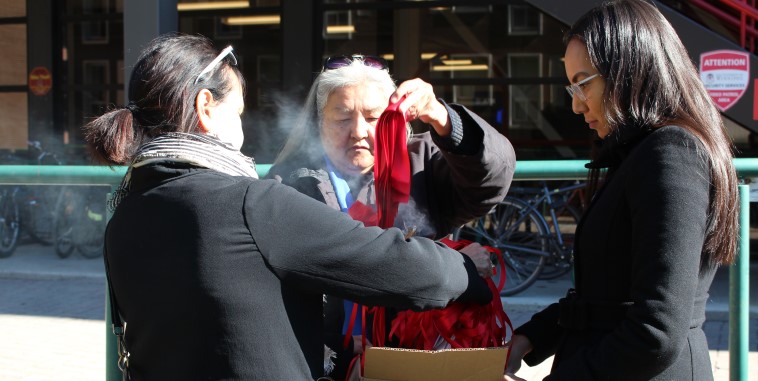Justice (Calls 25-42)
The University of Winnipeg acknowledges that we are gathered on ancestral lands, on Treaty One Territory. Our water is sourced from Shoal Lake 40 First Nation. These lands are the heartland of the Métis people.
We are committed to implementing the the recommendations of the Truth and Reconciliation Commission of Canada (TRC): Calls to Action.
Programs and initiatives
Some of the programs and initiatives that members of The University of Winnipeg community have undertaken related to Calls to Action 25-42: Justice are:
Walls to Bridges connects incarcerated and campus-enrolled students to study together inside the prison walls, earning credit toward their degrees, and sharing and life experiences
National Report on MMIWG Conference. In June 2022, Dr. Jane Barter and Dr. Jacqueline Romanow invite scholars, activists, educators, community and family members of MMIWG2S, direct student service providers and students to gather together for a National Report on MMIWG Conference and think about ways in which the Calls for Justice might be effectively addressed within the university context. (Calls 41.i, 41.ii)
231 Calls to Justice. In Fall 2020 Sandra Delaronde taught an MDP special topics course that provided students with an opportunity to develop an Indigenous and community-based responses to the implementation of 231 Calls to Action. The course is continuing to be developed for future offerings. (Calls 41.i, 41.ii)
Inquiring Minds presentation. On February 9, 2015, The University of Winnipeg Indigenous Advisory Circle presented Inquiring Minds: Understanding the call for, role of, and limitations on an inquiry into Missing and Murdered Indigenous Women, honouring the families of our stolen sisters and the survivors of violence. (Calls 41.i, 41.ii)
Student research. MAIG student Jennifer Meixner's masters thesis De-Colonizing Contemporary Criminal Justice: Indigenous Innovations in Manitoba presents local Indigenous voices on topics related to challenges and barriers in the Canadian justice system and ways to overcome them. (Call 30, 31)
Understanding intergenerational impact: ininiwag dibaajimowag: First Nations Men and the Inter-generational Experiences of Residential Schools is phase one of a three phase initiative, to assist in the collective Canadian healing process on the path to reconciliation. The project is being led by Dr. Lorena Fontaine, Indigenous Studies and Kent Davies, Oral History Centre. (Call 30, 31)
We Care Quilt. In March 2015, UWinnipeg hosted a roundtable discussion to address the issue of missing and murdered Indigenous women, girls, and two-spirit people. The We Care Quilt was made in recognition of the #WeCare Campaign, a campaign that takes a united and firm stance to ensure that the safety of Indigenous women, girls, and two-spirit people is realized in Canada. (Calls 41.i, 41.ii)
Publications
Borrows, J., Chartrand, L., Fitzgerald, O. E., & Schwartz, R. (Eds.). (2019). Braiding legal orders: implementing the United Nations Declaration on the Rights of Indigenous Peoples. CIGI. (Calls 27, 41.ii)
Fontaine, L. (2011). Reflections on the Indian Residential School Settlement Agreement: From Court Cases to Truth and Reconciliation. In Kristin Burnett and Geoff Read (Eds.) Aboriginal History: A Reader, Don Mills: Oxford University Press, 239-248 (first author). (Calls 27, 41.ii)
Fontaine, L. (2015). Reflection post-Residential School Settlement Agreement: Expressions of Reconciliation: Looking Back Forward Looking In Kristin Burnett and Geoff Read (Eds.) Aboriginal History: A Reader, Second Edition, Don Mills: Oxford University Press. 263-274. (first author). (Calls 27, 41.ii)
Fontaine, L. et al. (2014). Authentic Conversations Among, Daughter of Residential School Survivors. In Sheilagh Rogers et al (Eds.) Reconciliation & The Way Forward. Ottawa: Aboriginal Healing Foundation. 179-208. (Calls 27, 41.ii)
Fontaine, L. et al. (2014). Nimamasak: The Legacy of First nations Women Honouring Mothers and Motherhood. In Dawn Memee Lavell-Harvard and Kim Anderson (Eds.) Mothers of the Nations: Indigenous Mothering as Global Resistance, Reclaiming and Recovery, Toronto: Demeter Press.251-266. (Calls 27, 41.ii)
McCallum, M. Foreword to anniversary edition of John Milloy's , A National Crime: The Indian Residential School System and the Canadian State UM Press. (Calls 27, 41.ii)
Share how you're responding to the TRC's Calls to Action
If you have taken part in an initiative that contributes to The University of Winnipeg's commitment to Truth and Reconciliation, please email communications@uwinnipeg.ca

